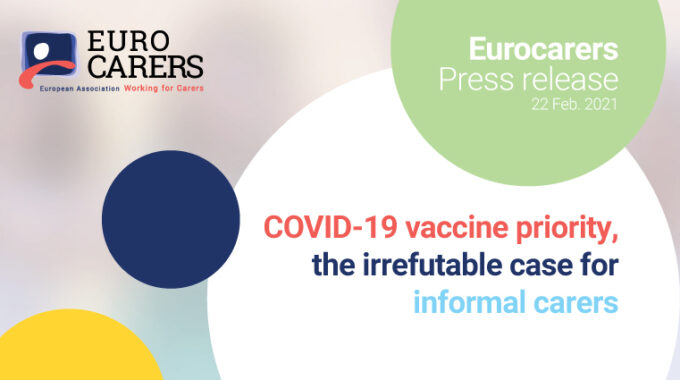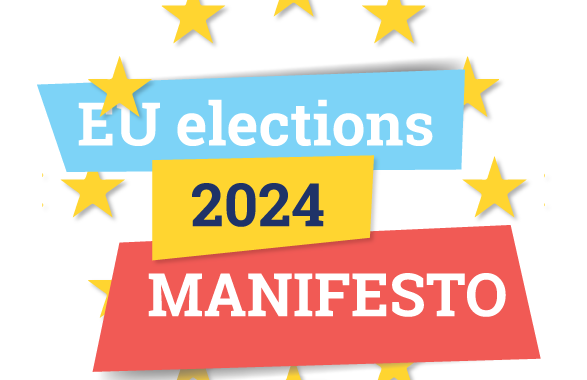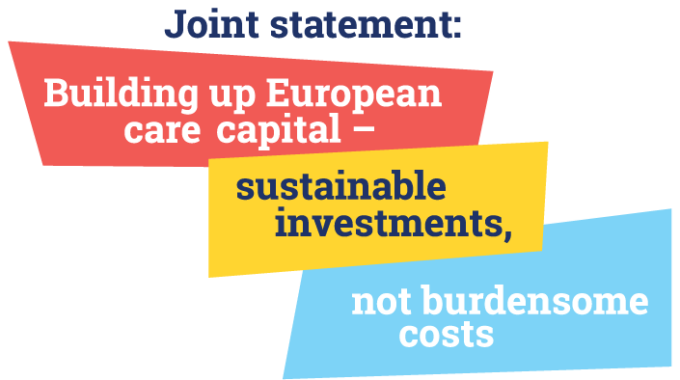
COVID-19 vaccine priority: the irrefutable case for informal carers
PRESS RELEASE Brussels, 22nd February 2021
Eurocarers urges EU policy makers to include informal carers in the priority groups for their vaccination campaigns.
Informal carers are the main providers of long-term care in Europe today[1] and a majority of them meet more than one of the key criteria:
- Informal carers assume caregiving responsibilities with all associated social, health and employment challenges as equal partners in care, delivering the care which public authorities are often unable to provide on their own;
- Informal carers are in close contact with and thus part of the most vulnerable and at-risk groups[2]; and
Informal carers often experience the greatest impact of social isolation and challenges to maintain an acceptable social, professional and care balance (home care services, respite care, access to their social network, etc.), due the lockdown and the reduction and closure of home-based health and social care services.
“Carers are frontline care providers and must be respected and supported as equal partners in care. They must be vaccinated alongside those they care for, just like paid carers and care home staff are” says Stecy Yghemonos, Eurocarers Director. “Literally no EU state can afford to go without the crucial contribution of unpaid family carers to our care systems and economies, would they become ill and unavailable. The argument that informal carers are difficult to identify must not be an excuse for inaction. On the contrary – offering carers the opportunity for vaccinations will help identify this vital group and allow other supports to be put in place to increase resilience, help prevent the breakdown of caring relationships and reduce crisis admissions to hospitals. “.
In its “Values framework for the allocation and prioritization of COVID-19 vaccination”[3], published in September 2020, the WHO Strategic Advisory Group of Experts on Immunization (SAGE) defined six core principles that should guide the distribution of vaccines – i.e. Human Well-Being, Equal Respect, Global Equity, National Equity, Reciprocity, and Legitimacy.
The framework encourages public authorities to:
- Take into account the vulnerabilities, risks and needs of groups who, because of underlying societal, geographic or biomedical factors, are at risk of greater impacts from the COVID-19 pandemic;
- Protect those who bear significant additional risks and impacts of COVID-19 to safeguard the welfare of others, including health and other essential workers; and
- Employ best available scientific evidence, expertise, and significant engagement with relevant stakeholders for vaccine prioritization between various groups.
In its subsequent roadmap from November 2020[4], SAGE recommends to give specific consideration to the following groups (unranked): health workers, older adults, persons whose state of health makes them particularly at risk, essential workers outside the health sector, workers who cannot socially distance, as well as vulnerable socioeconomic groups and other groups at higher risk.

_____________________
Eurocarers is the European network representing informal carers and their organisations, irrespective of the particular age or health need of the person they are caring for. Our network currently brings together 73 carers’ organisations as well as relevant research & development organisations from 26 countries. Eurocarers was established by and for its members and works from the ‘bottom up’ to ensure that the voices of carers are heard at local, regional, national and EU levels and that the impact of policy on their daily lives is recognised by both policymakers and politicians.
For more information: www.eurocarers.org
[1] It is estimated that 80% of long-term care in Europe is provided by families, friends and neighbours (Hoffmann and Rodrigues, 2010)
[2] 17% of people aged 65 or more are involved in caregiving activities – EQLS 2016
[3] WHO SAGE values framework for the allocation and prioritization of COVID-19 vaccination, WHO, 2020
[4] WHO SAGE Roadmap for prioritizing uses of COVID-19 vaccines in the context of limited supply, WHO, 2020





